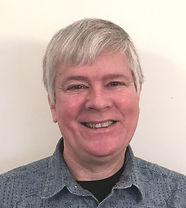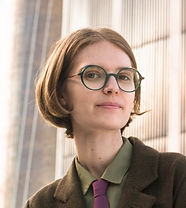2025 Session Descriptions & Presenter Bios
Collaborative Maker Projects: Lenticular and Other Moving Images
Kimberly Gerardi

This workshop is to encourage partnerships and collaborative projects in K-12 education. The workshop focuses on the relevance of Makerspace in all school subjects. We will focus on how to use a text in 8th grade English class and illustrations provided to create visual narrative for character analysis. Moving Images are created with lenticular film and other moving image options are explored.
Kimberly Gerardi
DesignLab Director
St. Luke's School
Kimberly Gerardi is the DesignLab Director at St. Luke's School in New Canaan CT. She has been a Makerspace teacher and collaborator since 2015 and has successfully developed multiple Makerspace Programs in CT. Kimberly has an MFA in Design Technology with strength in Scenic Design for Film and Stage, Construction, Events and Painting. She has a minor in Art History, a Bachelors in Communications and studied Architecture and Scene Painting. Kimberly has developed strategic partnerships for the DesignLab Program at St. Luke's and is rooted in collaboration, connection and outreach. To feel empathy; to be vulnerable; to allow others in by sharing our ideas is the most important connection of all.
MicroBlocks: Real time coding with the micro:bit!
John Maloney

MicroBlocks is a Scratch-like blocks language that lets complete beginners write programs with the micro:bit right away. Like Scratch, MicroBlocks is immediate and interactive, so users can try new commands and test their work as they go. This presentation will show you how to get started with MicroBlocks and introduce some fun beginner activities. It will also show how to use the micro:bit's sensors to explore the world around us. The micro:bit is an $18 battery-powered credit-card computer designed by the BBC to engage students in STEAM activities.
John Maloney
Co-creator
Scratch
John Maloney is best known as one of the co-creators of Scratch, which he worked on for its first eleven years. He also helped create Squeak Smalltalk, EToys, GP Blocks, and the Morphic UI framework. John created MicroBlocks in 2017 after watching a student struggle with the MakeCode download process. He holds B.S. and M.S. degrees from MIT and a Ph.D. in Computer Science from the University of Washington.
Friend, Foe, or Food? AI and Machine Learning in the Robot Village.
Grace Klein-Lee

Learn how to create a Robot Village where students are robot creators, teaching their bot critters how to forage for robot apples, avoid obstacles, and learn new things. Like any good creator, teaching is part of the process. Our critters are AI-camera enabled and will be “taught” how to use this “sense” and interpret the world.
Come explore our process of integrating Husky Lens AI Camera and Arduino to create autonomous robots, reverse engineering student understanding of training models, and building student ownership in the realm of AI & machine learning.
Grace Klein-Lee
Education Technician
The Possible Zone
Grace Klein-Lee is on a mission to awaken the maker inside every student. Understanding the "I can't do that’s" and "that sounds too hard’s" that hold students back, Grace creates student centered documentation to make complex concepts accessible and exciting in the classroom. As an Education Technician at The Possible Zone, she blends her experience as a multidisciplinary artist with a love for helping young people develop durable skills, STEAM agency, and networks that equip them for continuous learning and in-demand careers.I
The Outer Edge Polar Challenge - Antarctica inspired Innovation
Charles Werb

Join Charles Werb, founder of the Outer Edge Polar Challenge, for an overview of his educational initiatives where cardboard, creativity, and cutting-edge science collide. He will explain how to use real expedition challanges and data to lead your students through prototyping snowsailers, shelters, and Antarctic survival solutions. Integrated with Autodesk/Tinkercad design tools and live data from the upcoming Antarctic record attempt, the Cardboard Challenge empowers educators to connect sustainability, engineering, and storytelling. Discover how simple materials can spark big ideas, and take away classroom-ready strategies to inspire students with STEAM learning rooted in adventure, resilience, and real-world problem solving.
Charles Werb
Founder
Outer Edge Polar Challenge
Charles Werb is an explorer, and innovator and adventurer and a filmmaker. He has created and raced an award winning snow sail sled and created documentaries about his work using his invention in the coldest climates. Originally a member of the corporate world, he left all that to explore Antartica and break world records. In January 2026 he will be attempting to set two world records of speed and distance in Antartica. His adventure will be streamed for students worldwide and all the data will be available for student to use for their own innovations. Charles’s resilience, creativity, and ability to inspire through storytelling underscore his distinctiveness, making his journey not just a personal quest but a shared narrative that resonates with and encourages others.
From Process to Portfolio: Documenting the Maker Journey
Jeff Ellenbogen

Helping students develop new skills, problem solve, iterate, and express their ideas are all part of what makes Makerspace classes powerful learning opportunities. But how can students share what they learned? Documentation and reflection on their process is a powerful way for students develop deeper understanding and to share the story of their learning journey.
This session will focus on how teachers can use design journals and tools like Unrulr to provide students a structure to capture key moments of their process and progress to build portfolios that showcase their work.
Jeff Ellenbogen
Director of Innovation & Technology, Dawson School in Colorado
As Director of Innovation and Technology for Dawson School in Colorado, my work is focused on self-directed exploration as a path to problem-solving, skill development, and creative expression for students and colleagues. A passionate lifelong learner, I love taking on new projects for the fun of figuring things out and developing new skills. I was fortunate to be part of the design team for the Dawson Center for Innovation, where I now have the joy of working with the Dawson School community and collaborating with educators around the world.
Creating a Local Maker Cohort Community
Frank Devereaux

Maker Cohorts can help educators improve their STEAM and Engineering Design skills. Through monthly meetings, participants have a unique opportunity to learn new techniques and collaborate on innovative projects in a supportive setting. The aim is to foster a community of educators dedicated to maker-centered learning while facilitating networking within and between local districts. These gatherings will allow educators to share ideas, visit various spaces, and gain access to resources and expertise to enhance their makerspace programs.
Frank Devereaux
Innovative Deeper Learning Designer
Frank Devereaux is an Innovative Deeper Learning Designer from the Madison area and works as a consultant for the CESA2 region of WI. His experience centers on the integration of technology in creative and innovative ways to support student learning in the classroom. Over the past few years, he has been diving into the realm of AI integration, Assistive Technologies and Accessibility, Inclusivity and Equity in STEAM curricula, and Design Thinking Projects for the Makerspace that are culturally relevant!
Stories & STEM
Jasmine Florentine

Author-illustrator Jasmine Florentine shares insights from her recent graphic novel, Maker Girl and Professor Smarts, and explores how storytelling can transform STEM learning. Discover why narrative is such a powerful tool for making STEM concepts fun, relatable, and accessible to a wide range of kids, and learn strategies for using stories to spark curiosity, encourage tinkering, and support open-ended exploration at home, in classrooms, and makerspaces.
Jasmine Florentine
Author & Illustrator
Jasmine Florentine is an author and illustrator who is passionate about using creative approaches to engage kids with science and engineering. After receiving a master's degree from MIT in mechanical engineering, she worked as an engineer and artist for FIRST, a nonprofit that runs robotics competitions to inspire students to pursue STEM. Her debut novel, Hex Allen and the Clanksmiths, was released in 2022. When she is not building robots, drawing cartoons, or championing STEM, Jasmine Florentine loves hiking and rambling at length about her current favorite book, usually at the same time.
Making Is Messy: Unpacking the Problems of Practice in Library Makerspaces
Cindi L. Place

In this session, participants will explore Problem of Practices in regards to Library Makerspaces, reflecting on how they show up in their makerspaces and collectively identifying strategies they use to navigate them. Presenters will then introduce action-oriented tools from the Makers in the Library Toolkit that participants can leverage to address three key Problems of Practice: outreach and engagement, communicating value, and accessibility. The session will conclude with a collaborative brainstorming activity, reinforcing the value of professional networks in developing future tools and community-driven solutions. Networking will play a vital role throughout the session, as participants engage in discussions, share insights, and build connections to support ongoing problem-solving.
Cindi L. Place
Managing Director of Crooked Tree District Library
Presenter Cindi Place has worked in both school libraries, and several small, rural libraries in Northern Michigan and is currently the Managing Director of Crooked Tree District Library which has a service population of just over 5,000 people. She has implemented maker programs in each library she has led. She is currently the Chairperson of the Library Makers Leadership Team.
Building AI Apps with Playlab
Tess Ramsey

Playlab enables a global community of educators, students, and organizations to transform education with AI. They use Playlab to build AI literacy, explore possibilities and risks, and create tools that reflect their values and needs.
As an introduction to Playlab, this workshop will provide an opportunity for you to see how educators are using AI in their classrooms and will help you imagine AI applications that would benefit your own students.
Cindi L. Place
Makerspace Director, Speyer Legacy School in NYC
Tess Ramsey (they/them) is an artist and national award-winning educator based in NYC. They run a makerspace at The Speyer Legacy School for K-8 students and teach Creative and Computational Thinking classes. They are also a Playlab Certified Learning Engineer. Tess holds a BFA from the Tyler School of Art. In their free time, they love to knit and search for vintage virtual pets to add to their collection.
Intro to Tiny Machine Learning
Donaldo Almazan

This workshop session introduces educators to TinyML — machine learning on small, affordable microcontrollers. Using a XIAO ESP32-S3 microcontroller and the SenseCraft platform, we’ll walk through a couple activities that demonstrate & teach basic electronics skills, and showcase how students can train their own machine learning models to perform tasks like face recognition & object detection. This presentation highlights how students of all ages can tinker with AI & hardware to create projects that excite them, offering approachable entry points for computational thinking and design.
Donaldo Almazan
Event Organizer, Houston Robotics Group
Donaldo Almazan is an engineer, artist, and maker based in Houston, Texas, passionate about bridging the gap between the arts & technology through maker education. As an Electronics & Robotics enthusiast, he volunteers as an Event Organizer for the Houston Robotics Group. He works as a freelance product engineer & developer, uplifting various open-source projects and helping maintain the MakerEd website, supporting initiatives that empower educators and learners to explore design & fabrication skills in meaningful, approachable ways.